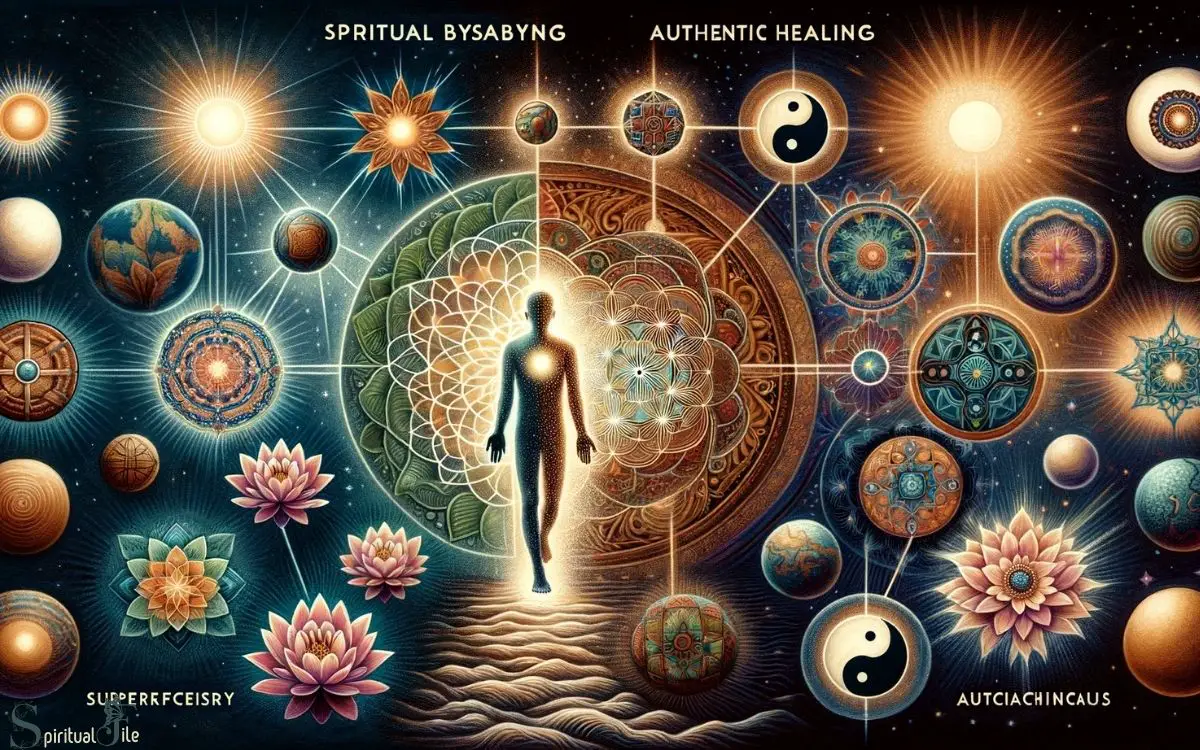Spiritual Bypassing Vs Authentic Healing: Personal Growth!
Spiritual bypassing and authentic healing are two distinct approaches to personal growth and emotional healing.
Spiritual bypassing is a coping mechanism that uses spirituality to avoid addressing underlying psychological issues, while authentic healing involves confronting and working through these issues to achieve genuine transformation.
Spiritual bypassing is a term coined by psychologist John Welwood in the 1980s. It refers to the process of using spiritual beliefs or practices to sidestep or avoid facing unresolved emotional issues, psychological wounds, and unfinished developmental tasks.
Here are some signs of spiritual bypassing:
- Overemphasis on positivity and avoidance of negative emotions
- Intellectualizing or excessive use of spiritual jargon
- Belittling the importance of addressing psychological problems
- Depersonalization or detachment from one’s feelings or body
In contrast, authentic healing is a holistic approach that involves integrating the spiritual, emotional, and psychological aspects of oneself.
It includes:
- Acknowledgement and acceptance of all emotions, including difficult ones
- Reflective self-examination and psychotherapy when needed
- Taking personal responsibility for one’s healing journey
- Grounding spiritual practice in everyday life and relationships
For example, someone may use meditation to feel peace but avoid dealing with a traumatic event from their past.
This could be spiritual bypassing. Authentic healing would involve using meditation as a tool to become more aware of the trauma’s impact and actively working through it.

Key Takeaway
4 Aspects: Spiritual Bypassing Vs Authentic Healing
| Aspects | Spiritual Bypassing | Authentic Healing |
|---|---|---|
| Approach | Avoidance of difficult emotions | Processing of emotions |
| Motivation | Escape pain and trauma | Integrate lessons from pain |
| Outcome | Suppression and denial | Emotional maturity and growth |
| Mindset | Disconnection from self | Self-awareness and self-love |
Understanding Spiritual Bypassing
Understanding spiritual bypassing requires a critical examination of how individuals use spiritual practices to avoid facing unresolved emotional or psychological issues.

This phenomenon often involves the misuse of spiritual beliefs or practices to sidestep uncomfortable feelings or difficult inner work.
It manifests as a tendency to prematurely transcend or overlook genuine human struggles by adopting a falsely positive, detached, or overly spiritualized stance.
Individuals engaging in spiritual bypassing may inadvertently suppress their authentic emotions, leading to a temporary sense of relief but ultimately hindering genuine healing and growth.
Recognizing the signs of spiritual bypassing is crucial in fostering true emotional and psychological well-being.
Recognizing Signs of Authentic Healing
How can we discern if the healing process is genuinely addressing unresolved emotional or psychological issues rather than merely offering a temporary sense of relief?

Recognizing signs of authentic healing involves paying attention to subtle cues that indicate deeper and lasting transformation.
Here are some key indicators to look out for:
- Embracing Vulnerability: Genuine healing encourages individuals to embrace vulnerability and explore their emotional wounds with courage and openness.
- Integration of Insights: Authentic healing involves integrating insights gained from therapy or self-reflection into one’s daily life and relationships.
- Increased Self-Awareness: A genuine healing process fosters increased self-awareness and a deeper understanding of one’s triggers and patterns.
- Sustainable Changes: Authentic healing leads to sustainable changes in behavior and thought patterns, rather than temporary fixes.
Recognizing these signs can help individuals navigate their healing journey with clarity and purpose, leading to long-term emotional and psychological well-being.
Impact on Mental and Emotional Well-being
When it comes to mental and emotional well-being, it’s crucial to consider the impact of authentic healing versus spiritual bypassing.
Authentic healing encourages growth and addresses discomfort, while spiritual bypassing tends to avoid confronting and working through emotional challenges.

Understanding the implications of these approaches on mental and emotional well-being can provide valuable insights into the effectiveness of each method.
Authentic Healing Fosters Growth
Authentic healing fosters growth in individuals’ mental and emotional well-being over time. It provides a solid foundation for sustainable and meaningful progress.
Here’s how authentic healing can positively impact mental and emotional well-being:
- Increased Self-Awareness: Authentic healing encourages individuals to explore their inner world, leading to a deeper understanding of their thoughts, emotions, and behaviors.
- Enhanced Emotional Regulation: Through authentic healing, individuals develop healthier coping mechanisms and learn to manage their emotions in a constructive manner.
- Improved Relationships: Genuine healing fosters better communication and empathy, which can lead to more fulfilling and harmonious relationships.
- Greater Resilience: Authentic healing equips individuals with the tools to navigate life’s challenges with resilience and strength, promoting overall mental and emotional well-being.
Spiritual Bypassing Avoids Discomfort
The practice of spiritual bypassing circumvents emotional discomfort, inhibiting genuine growth and hindering individuals’ mental and emotional well-being.
By avoiding facing and processing difficult emotions, individuals may temporarily feel relief, but this avoidance ultimately leads to unresolved issues that can negatively impact mental health.
The table below illustrates the differences between spiritual bypassing and authentic healing in addressing emotional discomfort:
| Aspect | Spiritual Bypassing | Authentic Healing |
|---|---|---|
| Approach | Avoidance of discomfort | Confrontation and processing of discomfort |
| Outcome | Temporary relief, long-term unresolved issues | Lasting emotional healing, genuine personal growth |
| Impact on well-being | Hinders mental and emotional well-being | Fosters improved mental and emotional health |
| Sustainability | Short-term fixes that do not address root causes | Long-term solutions that promote overall well-being |
This comparison highlights the detrimental impact of spiritual bypassing on mental and emotional well-being, underscoring the importance of authentic healing practices.
Overcoming Spiritual Bypassing Patterns
To effectively address and overcome spiritual bypassing patterns, it is essential to delve into the root causes and underlying emotions driving these avoidance mechanisms.
Overcoming spiritual bypassing requires a deep commitment to inner work and self-reflection.

Here are some practical steps to help navigate this process:
- Honest Self-Reflection: Take the time to honestly examine your thoughts, behaviors, and beliefs, and recognize where spiritual bypassing may be occurring.
- Emotional Awareness: Cultivate a deeper understanding of your emotions and learn to sit with discomfort rather than bypassing it.
- Therapeutic Support: Seek the guidance of a qualified therapist or counselor who can support you in exploring and addressing underlying emotional wounds.
- Mindfulness Practice: Engage in mindfulness and meditation practices to develop greater self-awareness and presence in the face of challenging emotions and experiences.
Embracing Vulnerability in Healing
Embracing vulnerability is a pivotal aspect of genuine healing, as it necessitates confronting the discomfort and pain that may have been previously bypassed in spiritual practices.

This process involves acknowledging and sitting with the raw emotions and experiences that have been avoided or suppressed.
It requires a willingness to be open and honest with oneself, as well as with trusted individuals within a supportive environment.
Embracing vulnerability allows for the release of pent-up emotions, leading to a deeper sense of self-awareness and emotional healing.
It provides an opportunity for individuals to connect with their innermost feelings and experiences, fostering a genuine and profound healing process.
By embracing vulnerability, individuals can begin to dismantle the barriers that have hindered their personal growth and overall well-being.
This sets the stage for integrating spiritual practices with authentic healing.
Integrating Spiritual Practices With Authentic Healing
Integrating spiritual practices with authentic healing involves a deliberate alignment of one’s inner spiritual journey with the process of genuine emotional and psychological recovery.
This integration aims to harmonize the spiritual and emotional aspects of an individual’s being, fostering holistic healing and growth.

Key aspects of integrating spiritual practices with authentic healing include:
- Mindfulness: Cultivating present-moment awareness to understand and navigate one’s emotions and thoughts.
- Self-compassion: Developing kindness and understanding towards oneself, essential for emotional healing.
- Connection: Fostering a sense of interconnectedness with others and the universe, promoting a deeper understanding of oneself.
- Self-reflection: Engaging in introspective practices to explore one’s inner world, aiding in emotional processing and healing.
Are Spiritual Healing and Physical Healing Interconnected in Personal Growth and Energy Work?
Yes, spiritual vs physical healing are interconnected in personal growth and energy work. Just as physical healing requires addressing emotional and mental blockages, spiritual healing can also have physical manifestations. Balancing the two can lead to overall well-being and personal growth.
FAQ About Spiritual Bypassing Vs Authentic Healing
How Do Cultural and Societal Factors Contribute to the Prevalence of Spiritual Bypassing in Modern Society?
Cultural and societal factors contribute to the prevalence of spiritual bypassing in modern society through idealized notions of spirituality, societal pressures to maintain positivity, and psychological issues.
Can You Provide Examples of How Spiritual Bypassing Can Manifest in Different Types of Relationships, Such as Romantic, Familial, or Professional?
In various relationships, spiritual bypassing may manifest as avoiding difficult conversations by resorting to spiritual platitudes, dismissing valid concerns under the guise of “everything happens for a reason.
What Are Some Common Misconceptions About Authentic Healing That Can Hinder an Individual’s Progress?
Common misconceptions about authentic healing may include the belief that it’s a quick fix, the idea that healing means forgetting the past, or the assumption that it requires no effort or discomfort.
Such misconceptions can hinder an individual’s progress.
How Can Individuals Identify and Address Any Underlying Trauma or Unresolved Emotions That May Be Fueling Their Spiritual Bypassing Patterns?
Individuals can identify underlying trauma or unresolved emotions fueling spiritual bypassing by exploring their emotional responses, seeking therapy, and practicing self-reflection.
Addressing these issues fosters authentic healing and allows for genuine emotional and spiritual growth.
Are There Specific Spiritual Practices or Rituals That Are Particularly Effective in Supporting Authentic Healing, and How Can They Be Integrated Into One’s Healing Journey?
Specific spiritual practices and rituals, such as mindfulness meditation, breathwork, and energy healing, can effectively support authentic healing.
Integrating these into one’s healing journey involves consistent practice, seeking guidance from experienced practitioners, and incorporating self-reflection.
Conclusion
The contrast between spiritual bypassing and authentic healing reveals the intricate and complex nature of the human experience. Recognizing and addressing spiritual bypassing patterns is essential for genuine emotional and mental well-being.
Embracing vulnerability and integrating spiritual practices can lead to an authentic and transformative healing journey. The impact of these practices on individuals is as vast and profound as the depths of the ocean.






